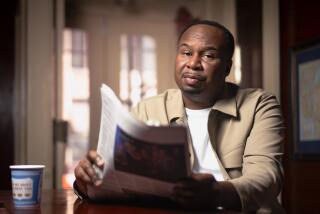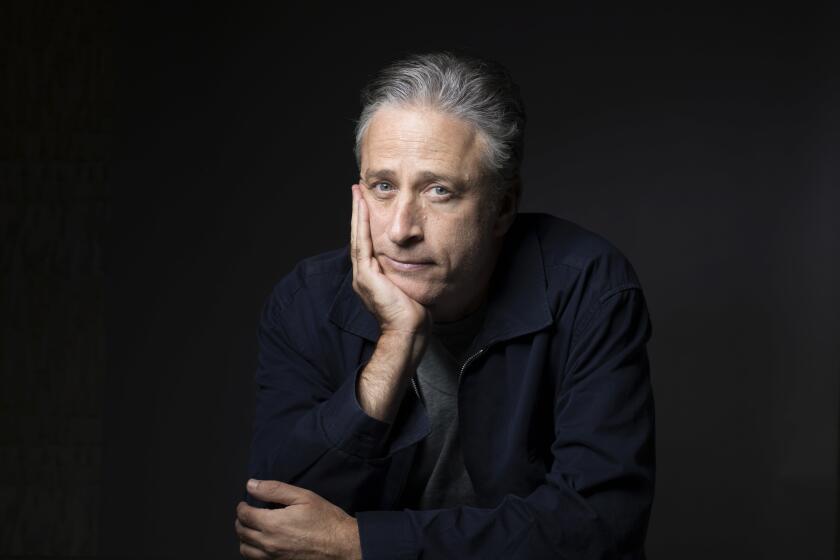Tom Snyder, 71; host of NBC’s ‘Tomorrow’ pioneered the late-late-night TV talk show
- Share via
Tom Snyder, the brash and provocative late-night TV talk-show host whose bellowing laugh and ever-present cigarette made him a pop culture icon ripe for parody in the 1970s, has died. He was 71.
Snyder died Sunday in San Francisco of complications associated with leukemia, Mike Horowicz, his longtime producer and friend, told the Associated Press on Monday.
“Tom was the very thing that all broadcasters long to be: compelling,” David Letterman, whose production company produced the show that marked Snyder’s return to late-night TV in the 1990s, said in a statement Monday.
“Whether he was interviewing politicians, authors, actors or musicians, Tom was always the real reason to watch,” Letterman said. “I’m honored to have known him as a colleague and as a friend.”
CNN talk-show host Larry King said in a statement to The Times: “Tom Snyder was one of a kind; he had a unique personality. He changed anchoring in television news; his approach was like no one else.”
A top-rated evening news anchor at KNBC-TV Channel 4 in Los Angeles in the early ‘70s, Snyder made the transition to late-night TV in 1973 as the host of “The Tomorrow Show,” which ran in the time slot after “The Tonight Show Starring Johnny Carson” until 1982.
As NBC’s late-late-night answer to old movies for insomniacs -- it originally aired from 1 to 2 a.m. and later from 12:30 to 2 a.m. -- “The Tomorrow Show” featured discussion topics such as group marriage, suicide, male prostitution, rock music groupies and film censorship.
Snyder also talked with newsmakers such as Teamsters union President Jimmy Hoffa, former Vice President Spiro Agnew, Watergate special prosecutor Leon Jaworski, and -- from prison in California -- Charles Manson. John Lennon, Marlon Brando and Orson Welles also sat for chats with Snyder.
“Fire up a colortini, sit back, relax, and watch the pictures, now, as they fly through the air,” Snyder would tell his viewers.
“I told [network executives] in the beginning, ‘Don’t put me in a monkey suit. Don’t put me in front of a band. I’m a newsman. I don’t tell jokes. I just talk about issues,’ ” Snyder recalled in a 1979 interview with Newsweek magazine.
“It’s sort of a little hip shoot,” Snyder said of his show. “Something’s got to happen or they’ll turn off the box at this hour. What will make the program will be when people begin to say, ‘Did you hear what that s.o.b. said at 1:20 this morning?’ ”
Tim Brooks and Earle Marsh, authors of “The Complete Directory to Prime Time Network and Cable TV Shows,” wrote of Snyder: “Tom could be sweet and ingenuous one moment, relentlessly probing the next.”
As for criticism of his sometimes arrogant, intimidating and belligerent on-camera demeanor, Snyder told the New York Times in 1977:
“I’m not just there as a piece of wood, for people to talk to. I’m a human being. I have opinions and biases and beliefs and standards, and I have to inject them into that program. Otherwise we might as well have an empty chair and give the guests a list of written questions and let them answer them.”
Despite the late hour, several million Americans regularly tuned into Snyder’s show. Letterman, whose original late-night show replaced Snyder’s on NBC in 1982, was one of them.
“I’d come home, turn on the TV, and suddenly NBC has this wonderful new show,” Letterman remarked when Snyder appeared on the Letterman show in 1994. “It was you, sitting low in your chair, darkly lit, smoke rolling out of your nose. The image and feeling of intimacy was overwhelming.”
Snyder quickly became fodder for parody, most memorably by Dan Aykroyd on “Saturday Night Live,” complete with a cloud of cigarette smoke, the dramatic delivery and the big laugh that former Times television critic Howard Rosenberg once described as exploding from Snyder’s “6-foot-4 body like a howitzer.”
“I was flattered,” Snyder said of Aykroyd’s impersonation in a 1994 interview with the New York Times. “It wasn’t a spiteful parody at all. And it was hilarious.”
What’s important about Snyder and “The Tomorrow Show,” said Robert J. Thompson, a professor of television and popular culture at Syracuse University, is that “he really helped settle real estate that had not been settled before: The suburbs of prime time had never stretched much past Johnny Carson.
“Most people thought at 1 o’clock at night, they’d watch ‘The Star-Spangled Banner’ and the station sign-off,” Thompson told The Times on Monday. “Snyder took that real estate after ‘The Tonight Show’ and turned it into something really worth watching.”
Reflecting on his long broadcasting career, Snyder once said: “It may sound corny, but I think I was born to do this.”
Born in Milwaukee on May 12, 1936, Snyder dreamed of becoming a radio disc jockey and often visited local radio stations.
Although he enrolled as a pre-med student at Marquette University after graduating from a local Jesuit high school, he soon switched to journalism.
While still a student, he landed a part-time news and disc-jockey job at a Milwaukee radio station.
He dropped out of Marquette a semester before graduation to take a TV news job in Savannah, Ga. Other work followed, including a mid-1960s stint as an anchorman at KTLA-TV Channel 5 in Los Angeles.
Snyder had been a popular evening news anchorman at KYW-TV in Philadelphia and co-host of a weekly hourlong talk show when he returned to Los Angeles in 1970. He anchored the 6 o’clock weeknight news on KNBC and hosted “Sunday,” a live, 90-minute interview show.
“I had never seen a person read the news with such excitement and clarity,” Robert E. Mulholland, who was then KNBC’s news producer and later president of the NBC television network, told Esquire magazine in 1978. “He read as if he were talking to you. I knew that it would only be a matter of time before everyone at the network was after him.”
Snyder became host of “The Tomorrow Show” in October, 1973. A year after its debut, “The Tomorrow Show” moved from Los Angeles to New York City, where Snyder also became an anchor at WNBC. Snyder later anchored the 1979-80 NBC newsmagazine “Prime Time Sunday.”
After “The Tomorrow Show” was canceled in 1982, Snyder became a news anchor at WABC-TV in New York for a time and later hosted his own show on the ABC radio network.
He was hosting a talk show on the CNBC cable channel when he was signed to host “The Late Late Show With Tom Snyder” on CBS.
The show, which ran from 1995 to 1999 and followed in the time slot after “The Late Show With David Letterman,” was produced by Letterman’s Worldwide Pants Inc.
“They just said, ‘Tom, be Tom. We know who you are. We know what you do.... Just do you. Don’t try to do anything else but you,’ ” Snyder told the Associated Press in 1995. “And if I did anything else, I would surely fail.”
Snyder, who announced on his website in 2005 that he had chronic lymphocytic leukemia, is survived by a daughter, Anne Mari Snyder; and two grandchildren.
More to Read
The complete guide to home viewing
Get Screen Gab for everything about the TV shows and streaming movies everyone’s talking about.
You may occasionally receive promotional content from the Los Angeles Times.






